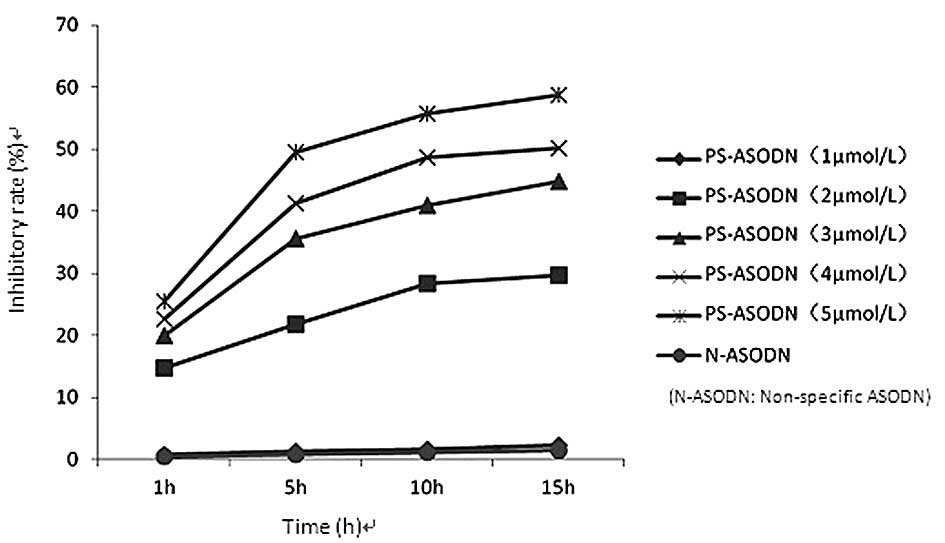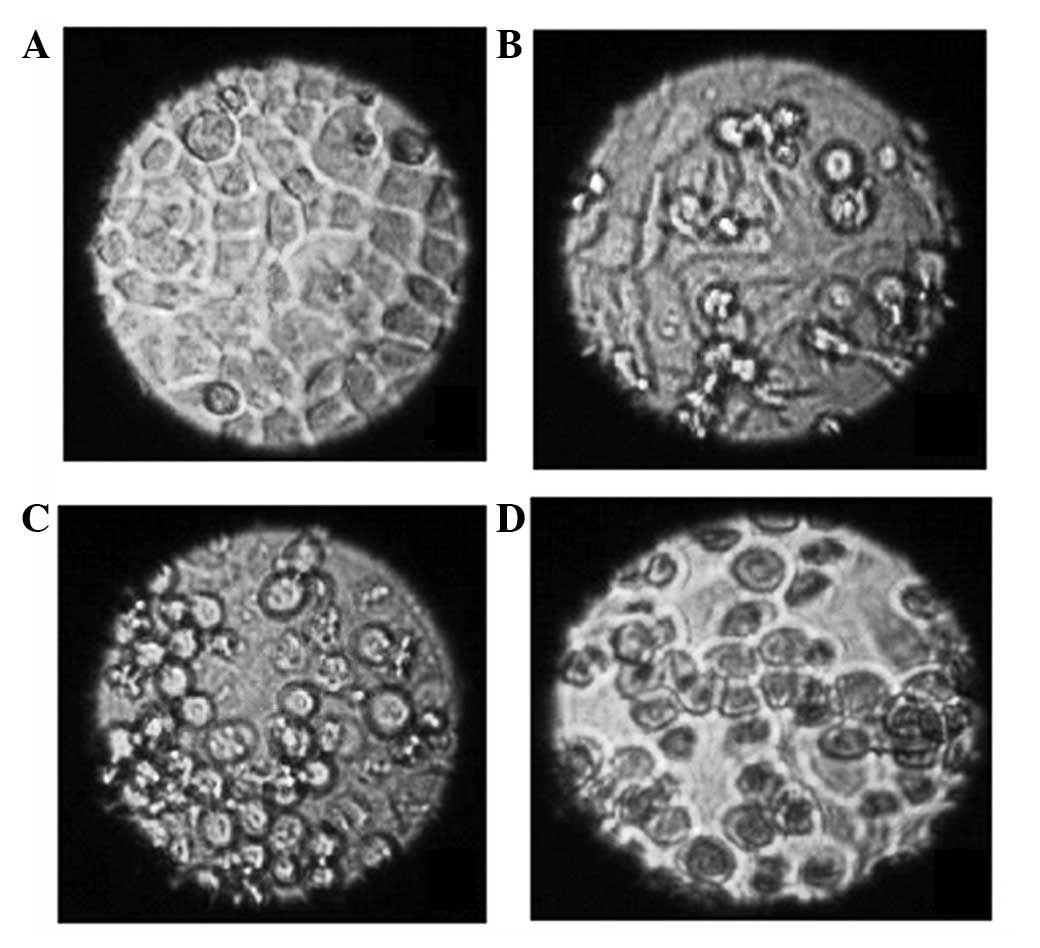|
1
|
Nittis T, Guittat L and Stewart SA:
Alternative lengthening of telomeres (ALT) and chromatin: is there
a connection? Biochimie. 90:5–12. 2008. View Article : Google Scholar : PubMed/NCBI
|
|
2
|
Rao YK, Kao TY, Wu MF, Ko JL and Tzeng YM:
Identification of small molecule inhibitors of telomerase activity
through transcriptional regulation of hTERT and calcium induction
pathway in human lung adenocarcinoma A549 cells. Bioorg Med Chem.
18:6987–6994. 2010. View Article : Google Scholar
|
|
3
|
Hiyama E and Hiyama K: Telomerase as tumor
marker. Cancer Lett. 194:221–233. 2003. View Article : Google Scholar
|
|
4
|
Zhang RG, Wang XW, Yuan JH, et al: Human
hepatoma cell telomerase activity inhibition and cell cycle
modulation by its RNA component antisense
oligodeoxyribonucleotides. Acta Pharmacol Sin. 21:742–746.
2000.
|
|
5
|
Kim NW, Piatyszek MA, Prowse KR, et al:
Specific association of human telomerase activity with immortal
cells and cancer. Science. 266:2011–2015. 1994. View Article : Google Scholar : PubMed/NCBI
|
|
6
|
Bellon M and Nicot C: Regulation of
telomerase and telomeres: human tumor viruses take control. J Natl
Cancer Inst. 100:98–108. 2008. View Article : Google Scholar : PubMed/NCBI
|
|
7
|
Naka K, Yokozaki H, Yasui W, Tahara H and
Tahara E and Tahara E: Effect of antisense human telomerase RNA
transfection on the growth of human gastric cancer cell lines.
Biochem Biophys Res Commun. 255:753–758. 1999. View Article : Google Scholar : PubMed/NCBI
|
|
8
|
Mukai S, Kondo Y, Koga S, Komata T, Barna
BP and Kondo S: 2–5A antisense telomerase RNA therapy for
intracranial malignant gliomas. Cancer Res. 60:4461–4467. 2000.
|
|
9
|
Jiang YA, Luo HS, Fan LF, Jiang CQ and
Chen WJ: Effect of antisense oligodeoxynucleotide of telomerase RNA
on telomerase activity and cell apoptosis in human colon cancer.
World J Gastroenterol. 10:443–445. 2004.PubMed/NCBI
|
|
10
|
Yuan Z and Mei HD: Inhibition of
telomerase activity with hTERT antisense increases the effect of
CDDP-induced apoptosis in myeloid leukemia. Hematol J. 3:201–205.
2002. View Article : Google Scholar : PubMed/NCBI
|
|
11
|
Folini M, Brambilla C, Villa R, et al:
Antisense oligonucleotide-mediated inhibition of hTERT, but not
hTERC, induces rapid cell growth decline and apoptosis in the
absence of telomere shortening in human prostate cancer cells. Eur
J Cancer. 41:624–634. 2005. View Article : Google Scholar
|
|
12
|
Kraemer K, Fuessel S, Schmidt U, et al:
Antisense-mediated hTERT inhibition specifically reduces the growth
of human bladder cancer cells. Clin Cancer Res. 9:3794–3800.
2003.
|
|
13
|
Yu HP, Xu SQ, Lu WH, et al: Telomerase
activity and expression of telomerase genes in squamous dysplasia
and squamous cell carcinoma of the esophagus. J Surg Oncol.
86:99–104. 2004. View Article : Google Scholar : PubMed/NCBI
|
|
14
|
Kim NW, Piatyszek MA, Prowse KR, et al:
Specific association of human telomerase activity with immortal
cells and cancer. Science. 266:2011–2015. 1994. View Article : Google Scholar : PubMed/NCBI
|
|
15
|
Sekaran VG, Soares J and Jarstfer MB:
Structures of telomerase subunits provide functional insights.
Biochim Biophys Acta. 1804:1190–1201. 2010. View Article : Google Scholar : PubMed/NCBI
|
|
16
|
Shammas MA, Koley H, Bertheau RC, et al:
Telomerase inhibitor GRN163L inhibits myeloma cell growth in vitro
and in vivo. Leukemia. 22:1410–1418. 2008. View Article : Google Scholar : PubMed/NCBI
|
|
17
|
Chen Z, Koeneman KS and Corey DR:
Consequences of telomerase inhibition and combination treatments
for the proliferation of cancer cells. Cancer Res. 63:5917–5925.
2003.PubMed/NCBI
|
|
18
|
Kushner DM, Paranjape JM, Bandyopadhyay B,
et al: 2–5A antisense directed against telomerase RNA produces
apoptosis in ovarian cancer cells. Gynecol Oncol. 76:183–192.
2000.
|
|
19
|
Kondo Y, Koga S, Komata T and Kondo S:
Treatment of prostate cancer in vitro and in vivo with
2–5A-anti-telomerase RNA component. Oncogene. 19:2205–2211.
2000.
|
|
20
|
Fan Xang-kui, Yan Rui-Hua and Li Yi:
Antisense oligodeoxynucleotides of human telomerase inhibits
esophagus carcinoma cell Eca-109 proliferation. China Oncology.
15:88–89. 2005.
|
|
21
|
Donate LE and Blasco MA: Telomeres in
cancer and ageing. Philos Trans R Soc Lond B Biol Sci. 366:76–84.
2011. View Article : Google Scholar : PubMed/NCBI
|
|
22
|
Zvereva MI, Shcherbakova DM and Dontsova
OA: Telomerase: structure, functions, and activity regulation.
Biochemistry (Mosc). 75:1563–1583. 2010. View Article : Google Scholar : PubMed/NCBI
|
|
23
|
Nakamura M, Masutomi K, Kyo S, et al:
Efficient inhibition of human telomerase reverse transcriptase
expression by RNA interference sensitizes cancer cells to ionizing
radiation and chemotherapy. Hum Gene Ther. 16:859–868. 2005.
View Article : Google Scholar
|


















